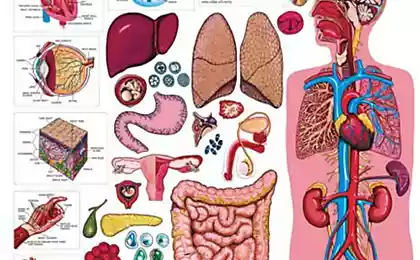571
FOMO is the main disease of the XXI century
To finish three projects, save for two vacations, in time for Friday night — think, and whether it is necessary. Alex Goines, a second year student at the American College, had the enviable opportunity: its took a training course in Paris for a whole month. But it turned out that to say the French capital "bonjour" is not so easy.

Goines, who is now graduating from Asbury in Kentucky, USA, says: "I couldn't decide on a trip, because then I would have missed a semester at the University, not to mention all the parties and life in General on campus." In the end, study abroad is not gone.
That's quite a radical manifestation of Fear not to Miss anything, or FOMO (English FOMO), but in the life of 21-year-old Goines was and others. For example, this summer she worked two jobs, participated in two internships and took two order in writing lyrics — she calls it "working FOMO".
Friday night, she often went to the party, but should relax after the work week — and then came the moment of reckoning. She says:
"You're afraid to miss the party — suddenly there will be something important so important that then all life will regret. I think it's all about culture, tied to social networks". Goines law. In a series of papers published in 2013 in the journal Computers in Human Behavior, — it was the first time introduced the concept of FOMO, — scientists have discovered that this fear is "definitely associated" with the use of social networks, and the most he is exposed to people under the age of 30 years.
Linda Sapadin, a psychologist from the city of valley stream in the state of new York, who was not involved in these research projects, commented:
"You know everything about everyone, where they are and what they do, and all this is served in the superlative degree, as if with a constant exclamation point. Nobody writes about the bad, the difficulties, or doubts — all of everything is always good. And so the whole tape, one after the other".
The negative effects of FOMO is manifested not only in excessive self-pity. Also studies have linked this phenomenon with inattention behind the wheel. This is confirmed by the insurance company Liberty Mutual and the results of a survey conducted by Students Against Destructive Decisions ("Students against destructive behavior"). Interviewing more than 1.6 million high school students, they found that 34% of Teens are distracted from the road, getting the message in Snapchat, Instagram or Twitter — the origins of this dangerous trend the organizers of the survey see the habit of young people to always be connected, including in social networks.
FOMO can have a negative impact on mental health. If you believe the journal Computers in Human Behavior, this fear is associated with low mood and reduced life satisfaction. Linda Sapadin, working with people who can't get over the feeling of defeat, wrote a book about dealing with fears. She says: "the Combination of feelings of indecision and insecurity can destroy a person's life. It turns into an anxiety disorder, dismay, and it is impossible to just relax and appreciate the good that is in your life".
Social hunger Is called FOMO, a syndrome of "the grass is always greener" disorder type "a desire to have it all" or just "holiday envy". Many people worry when staying away from what is happening. Strong social ties are important for good health; studies show that they can even prolong life.
Professor of psychology and neuroscience mark Leary of Duke University, where he directs the interdisciplinary center for behavioral studies, says:
"The adoption of the society was and remains very important to people, so similar experience [FOMO] in small quantities may even be beneficial. Like any other negative emotion, it serves as a warning signal, like telling us: "Pay attention to the quality of their social ties." It is very natural, very human and quite within the norm".
But if this anxiety becomes persistent, then you need to find the cause. It can be psychological disturbance, for example, anxiety disorder, or people are simply spending too much time in Facebook. Leary says:
"If you always feel that life is passing and you're missing it — there is a serious problem". The difference between people who from time to time experiencing FOMO in normal quantities, and those for whom it interferes with normal life, tied to their condition in real life. Leary gives the example:
"So hungry people can be very sensitive to what the people around him eat."
Of sapadin adds that some FOMO is associated with perfectionism, when a person requires a partner complete perfection, and certainly of the ideal life, and less he is not satisfied. Whatever the reason, in such severe cases should seek help from a professional.
Struggle with chronic FOMO After the first year of study at the University instead of overseas internships, Goines faced with the unpleasant consequences of his syndrome. She says:
"I lost a unique opportunity, and then I realized that many of my friends for whom I left, not really wondering how I'm doing".
Goines also noted that the observation of an enviable life that are friends in social networks only exacerbates her condition. So she decided to sit on a kind of diet this year she left Facebook — the main culprit of their problems — four months. She says:
"I just wanted to stop thinking about how people spend their Friday nights, and as I sit at home, or to look with envy at pictures of other people's holidays and to think about the fact that I'm stuck in a tiny town in Kentucky."
And "diet" worked. Although now Alex again uses Facebook to study and sometimes to communicate with family and friends in other cities, she said, FOMO largely failed to win. And when in April she again was offered a part in the foreign program of research, she said, "Yes." Now she's in Paris, and that in itself is a cure for FOMO. Goines says: "the French are a more leisurely way of life, not be fixated on work and study, it really helps".
What about those who suffer from FOMO, but can't afford to move to Paris? In addition to non-social networks, Sapadin offers to try not to compare your life with other people, and focus on your own tasks. She says:
"Think about priorities. And, when dealing with people who are dear to you, put your phone away. Otherwise, you will still miss important out of fear to miss the secondary. Of course, if you believe the media, we need — and that and that and that. But really, to say something "Yes" something else you have to say 'no'." Leary advises to look at the problem from a different angle: "You're also doing some things that other people think with envy and feeling that they are missing something. So it's not that you are unique, you just look at the situation only from one side." published
P. S. And remember, just changing your mind — together we change the world! © Join us at Facebook , Vkontakte, Odnoklassniki
Source: insider.pro/EN/article/46864/

Goines, who is now graduating from Asbury in Kentucky, USA, says: "I couldn't decide on a trip, because then I would have missed a semester at the University, not to mention all the parties and life in General on campus." In the end, study abroad is not gone.
That's quite a radical manifestation of Fear not to Miss anything, or FOMO (English FOMO), but in the life of 21-year-old Goines was and others. For example, this summer she worked two jobs, participated in two internships and took two order in writing lyrics — she calls it "working FOMO".
Friday night, she often went to the party, but should relax after the work week — and then came the moment of reckoning. She says:
"You're afraid to miss the party — suddenly there will be something important so important that then all life will regret. I think it's all about culture, tied to social networks". Goines law. In a series of papers published in 2013 in the journal Computers in Human Behavior, — it was the first time introduced the concept of FOMO, — scientists have discovered that this fear is "definitely associated" with the use of social networks, and the most he is exposed to people under the age of 30 years.
Linda Sapadin, a psychologist from the city of valley stream in the state of new York, who was not involved in these research projects, commented:
"You know everything about everyone, where they are and what they do, and all this is served in the superlative degree, as if with a constant exclamation point. Nobody writes about the bad, the difficulties, or doubts — all of everything is always good. And so the whole tape, one after the other".
The negative effects of FOMO is manifested not only in excessive self-pity. Also studies have linked this phenomenon with inattention behind the wheel. This is confirmed by the insurance company Liberty Mutual and the results of a survey conducted by Students Against Destructive Decisions ("Students against destructive behavior"). Interviewing more than 1.6 million high school students, they found that 34% of Teens are distracted from the road, getting the message in Snapchat, Instagram or Twitter — the origins of this dangerous trend the organizers of the survey see the habit of young people to always be connected, including in social networks.
FOMO can have a negative impact on mental health. If you believe the journal Computers in Human Behavior, this fear is associated with low mood and reduced life satisfaction. Linda Sapadin, working with people who can't get over the feeling of defeat, wrote a book about dealing with fears. She says: "the Combination of feelings of indecision and insecurity can destroy a person's life. It turns into an anxiety disorder, dismay, and it is impossible to just relax and appreciate the good that is in your life".
Social hunger Is called FOMO, a syndrome of "the grass is always greener" disorder type "a desire to have it all" or just "holiday envy". Many people worry when staying away from what is happening. Strong social ties are important for good health; studies show that they can even prolong life.
Professor of psychology and neuroscience mark Leary of Duke University, where he directs the interdisciplinary center for behavioral studies, says:
"The adoption of the society was and remains very important to people, so similar experience [FOMO] in small quantities may even be beneficial. Like any other negative emotion, it serves as a warning signal, like telling us: "Pay attention to the quality of their social ties." It is very natural, very human and quite within the norm".
But if this anxiety becomes persistent, then you need to find the cause. It can be psychological disturbance, for example, anxiety disorder, or people are simply spending too much time in Facebook. Leary says:
"If you always feel that life is passing and you're missing it — there is a serious problem". The difference between people who from time to time experiencing FOMO in normal quantities, and those for whom it interferes with normal life, tied to their condition in real life. Leary gives the example:
"So hungry people can be very sensitive to what the people around him eat."
Of sapadin adds that some FOMO is associated with perfectionism, when a person requires a partner complete perfection, and certainly of the ideal life, and less he is not satisfied. Whatever the reason, in such severe cases should seek help from a professional.
Struggle with chronic FOMO After the first year of study at the University instead of overseas internships, Goines faced with the unpleasant consequences of his syndrome. She says:
"I lost a unique opportunity, and then I realized that many of my friends for whom I left, not really wondering how I'm doing".
Goines also noted that the observation of an enviable life that are friends in social networks only exacerbates her condition. So she decided to sit on a kind of diet this year she left Facebook — the main culprit of their problems — four months. She says:
"I just wanted to stop thinking about how people spend their Friday nights, and as I sit at home, or to look with envy at pictures of other people's holidays and to think about the fact that I'm stuck in a tiny town in Kentucky."
And "diet" worked. Although now Alex again uses Facebook to study and sometimes to communicate with family and friends in other cities, she said, FOMO largely failed to win. And when in April she again was offered a part in the foreign program of research, she said, "Yes." Now she's in Paris, and that in itself is a cure for FOMO. Goines says: "the French are a more leisurely way of life, not be fixated on work and study, it really helps".
What about those who suffer from FOMO, but can't afford to move to Paris? In addition to non-social networks, Sapadin offers to try not to compare your life with other people, and focus on your own tasks. She says:
"Think about priorities. And, when dealing with people who are dear to you, put your phone away. Otherwise, you will still miss important out of fear to miss the secondary. Of course, if you believe the media, we need — and that and that and that. But really, to say something "Yes" something else you have to say 'no'." Leary advises to look at the problem from a different angle: "You're also doing some things that other people think with envy and feeling that they are missing something. So it's not that you are unique, you just look at the situation only from one side." published
P. S. And remember, just changing your mind — together we change the world! © Join us at Facebook , Vkontakte, Odnoklassniki
Source: insider.pro/EN/article/46864/
Find out why your self-esteem is falling and what it means to you.
To the last comma: how did the punctuation






















